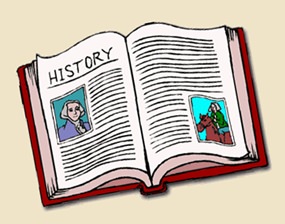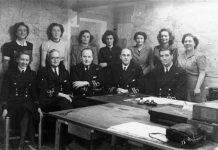Today is Monday May 16, the 137th day of 2014. There are 229 days left in the year.
Highlights in history on this date:
1532 – Spanish conquistador Francisco Pizarro lands with a small band of soldiers on the northern coast of Peru.
1596 – Spanish stronghold of La Fere, in what is now northern France, capitulates to French.
1770 – Marie Antoinette, age 14, marries the future king of France, Louis XVI, who is 15.
1866 – U.S. Congress authorizes minting of the nickel.

1871 – British Columbia, a British colony, becomes a province of Canada.
1920 – Joan of Arc is canonized in Rome.
1929 – The first Academy Awards are presented during a banquet at the Hollywood Roosevelt Hotel.
1932 – Japan’s Premier Tsuyoshi Inukai is assassinated in Tokyo.
1941 – The Icelandic parliament ends treaty with Denmark, proclaims independence.
1961 – Maj. Gen. Park Chung-hee stages a military coup in South Korea and rules until his intelligence chief assassinates him in 1979.
1962 – U.S. Marines begin arriving in Thailand to help counter communist threat from neighboring Laos.
1966 – China’s Cultural Revolution begins when the Communist party’s Politburo approves an edict from Chairman Mao Zedong. An elite corps of young zealous students, the Red Guards, is formed to attack traditional values and bourgeois thinking.
1969 – Soviet spacecraft reaches vicinity of planet Venus and drops capsule that sends back information on planet’s atmosphere.
1975 – Japanese climber Junko Tabei becomes the first woman to reach the summit of Mount Everest.
1979 – Police in El Salvador seal off capital after 10 days of violence by anti-government groups takes 44 lives.
1987 – Leader of military coup in Fiji calls for new constitution to block Indian-dominated government.
1989 – Hundreds of thousands arrive in Beijing to support college students fasting for freedom in Tiananmen Square.
1990 – Responding to Soviet pressure, Lithuanian government suspends enforcement of independence laws in that republic.
1991 – France’s first female prime minister, Edith Cresson, takes office; Queen Elizabeth II becomes the first British monarch to address the U.S. Congress.
1992 – A special governing panel fires Azerbaijani President Ayaz Mutalibov, a former communist. Ebulfaz Elcibey later wins elections.
1993 – Maoist rebels bomb bank and bridge in Lima, Peru, capping a three-day offensive that kills seven.
1994 – Scotland Yard for the first time approves a plan to allow some London police officers to openly carry firearms.
1995 – Japanese police arrest doomsday cult leader Shoko Asahara in connection with the nerve-gas attack that killed 12 on Tokyo’s subways two months earlier.
1996 – Romano Prodi, an economist who led a center-left coalition dominated by former Communists to electoral victory, is chosen premier of Italy’s 55th postwar government.
1997 – In the face of rebellion, Zaire’s President Mobutu Sese Seko gives up power after 32 years of autocratic rule.
1999 – Iranian President Mohammad Khatami is greeted with warm embraces and kisses on his historic visit to Saudi Arabia, the first by an Iranian leader in two decades. He mentions hope for “a new era” between the two countries and a stable Persian Gulf.
2000 – Cuba frees Marta Beatriz, a well-known dissident there, following a United Nations censure for human rights abuses.
2001 – Former FBI agent Robert Hanssen is indicted on charges of spying for Moscow. He later pleads guilty to 15 counts of espionage and is sentenced by a U.S. court to life in prison without parole.
2002 – Pakistani police unearth remains of Daniel Pearl, a reporter for the U.S. Wall Street Journal newspaper, who was kidnapped in January and whose execution was recorded on a videotape.
2003 – Twenty-nine people are killed and about 100 others injured in five nearly simultaneous suicide bombing attacks in Casablanca, Morocco’s largest city and commercial center.
2006 – Nigeria’s Senate rejects a proposed constitutional amendment that could have allowed its president, Olusegun Obasanjo, a third term — a proposal that had widened regional, ethnic and religious rifts in Africa’s most-populous nation.
2007 – Estonia’s first and only synagogue opens, six decades after previous houses of worship were destroyed in World War II.
2008 – An Iranian Embassy convoy comes under fire in Baghdad, wounding two Iranian diplomats and two other staff. Tehran accuses the United States of encouraging attacks against Iranian interests in Iraq.
2009 – The ruling Congress Party sweeps to a resounding victory in India’s national elections, defying expectations as it brushes aside the Hindu nationalist opposition and a legion of ambitious smaller parties.
2010 – Iraq’s electoral commission affirms the narrow victory of a Sunni-backed bloc in the March vote after a partial recount undercut the Shiite Prime Minister Nouri al-Maliki’s claims of fraud in the tally.
2011 – The usually uninhibited and irreverent Chinese artist Ai Weiwei seems a different man in custody as he sits, red-eyed and tense, for what his wife says was a brief, monitored meeting — his first contact with the outside world in 43 days.
2012 – Russian police arrest about 20 protesters at a central Moscow square where demonstrators had moved after police uprooted them from a camp, the latest move in a broadening crackdown on the forces opposing President Vladimir Putin.
2013 — The first exiles from an Iranian opposition group have moved to Albania from a camp near Baghdad as part of a relocation process, the U.N. says, a step toward defusing an explosive dispute left over from the Iran-Iraq war of the 1980s and the U.S.-led ousting of President Saddam Hussein. n9h
Today’s Birthdays:
Maria Agnesi, Italian, first woman to become a known mathematician (1718-1799); Henry Fonda, U.S. actor (1905-1982); H.E. Bates, English author (1905-1974); Woody Herman, U.S. jazz musician (1913-1987); Pierce Brosnan, Irish actor (1953–); Debra Winger, U.S. actress (1955–); Janet Jackson, U.S. pop singer (1966–); Tori Spelling, U.S. actress (1973–).
Thought For Today:
Ideas won’t keep; something must be done about them — Alfred North Whitehead, English philosopher-mathematician (1861-1947).
Copyright 2016 The Associated Press. All rights reserved. This material may not be published, broadcast, rewritten or redistributed.




